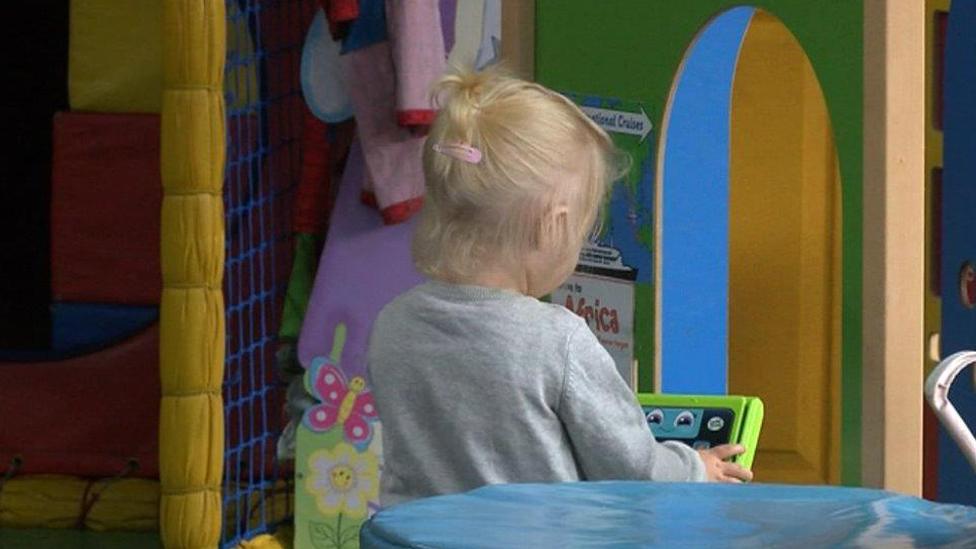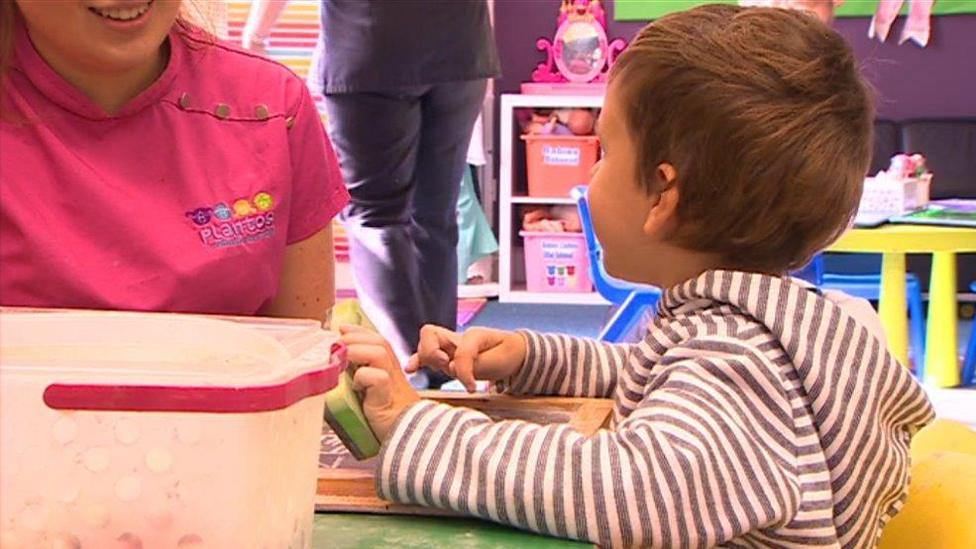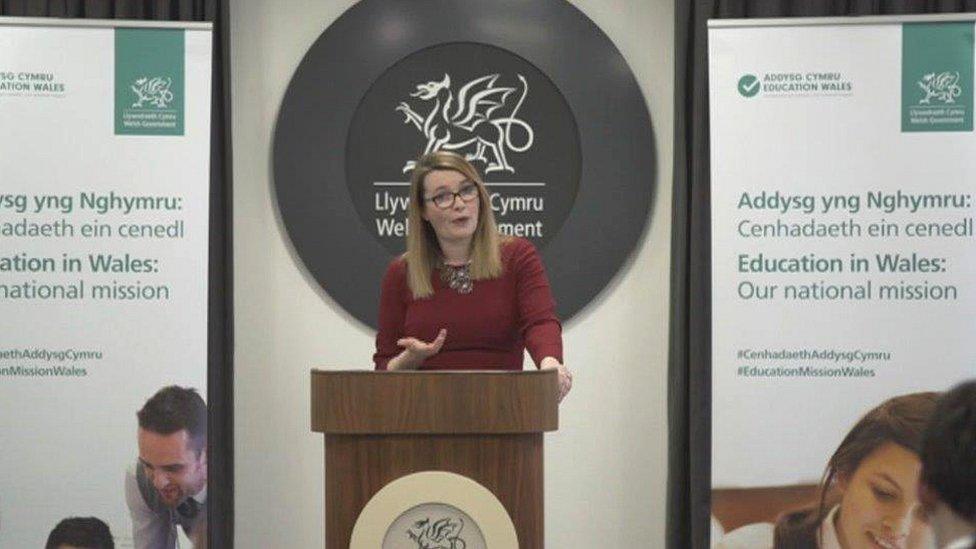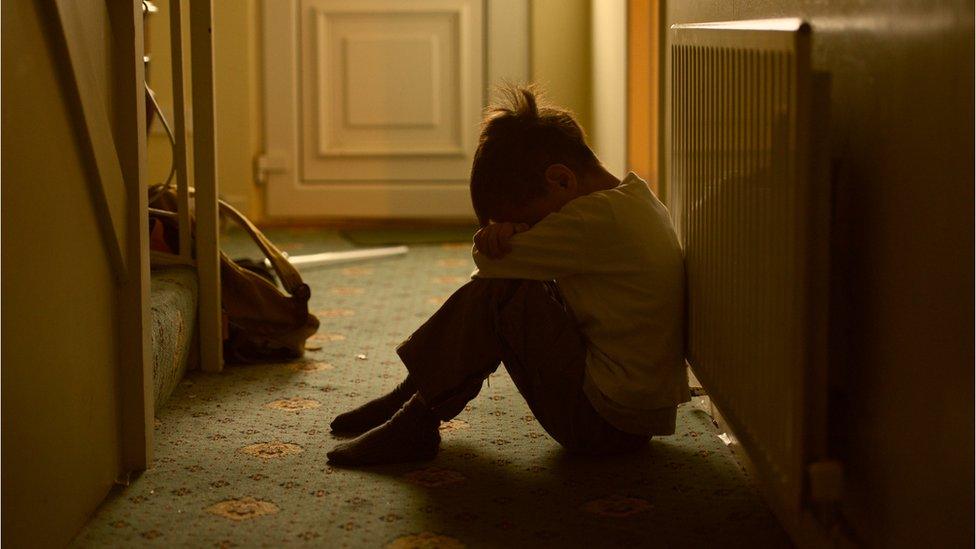Curriculum worry over compulsory English in Welsh nurseries
- Published

There has been a call for clarity on what the proposals mean for Welsh medium nurseries
Concerns have been raised about the Welsh Government's plans to make English a compulsory subject for children in Welsh-medium nurseries.
Welsh teaching union Ucac said the proposal in the new Curriculum White Paper was "a serious concern".
Campaigners Cymdeithas yr Iaith Gymraeg (The Welsh Language Society) and Plaid Cymru have also raised concerns.
But ministers say Welsh language immersion will be a "key feature" of the draft curriculum out in April.
Currently, English is introduced incrementally from the age of seven in Welsh-medium schools.

The union Ucac says children need to immerse themselves in the Welsh language
Under the new proposals, external, English would be introduced to three-year-olds in "cylchoedd meithrin" settings, that is Welsh-medium playgroups.
The consultation document said it would be a "duty on all schools and funded nursery settings to teach English as a compulsory element of the new curriculum for Wales".
Rebecca Williams, Ucac deputy general secretary, wants clarification as soon as possible.
Allowing children to immerse themselves in the Welsh language has proved extremely effective at giving children from all linguistic backgrounds the skills to become fluent, she said.
"In a situation such as in Wales, where we have a minority language living alongside one of the world's most powerful languages, this has proven to be the most effective model," Ms Williams added.
"It gives learners a strong foothold in Welsh that they would probably not acquire otherwise, whilst also fully developing their English language skills."
She said the proposal threatened effective practice and was in direct conflict with Welsh Government policy to boost the number of Welsh speakers.
Launching the White Paper on Monday, Education Minister Kirsty Williams said the proposed changes, external were "ambitious and far-reaching".
But Siân Gwenllian AM, Plaid Cymru education and Welsh spokeswoman, said the proposal "undermines the whole philosophy of Welsh-medium education and the experience of decades of language planning in Wales".

Kirsty Williams launched the three-month consultation on Monday - detailed curriculum content will follow in April
Cymdeithas yr Iaith chairman Osian Rhys, said: "I hope the government will admit it has made a mistake here.
"As far as we know, no-one has recommended that English should be compulsory in the new curriculum. Certainly, Prof Donaldson didn't call for it.
"Whoever has written this doesn't understand how children become fluent in a minoritised language like Welsh."
He said spaces where Welsh was the norm were very scare and it could undermine decades of growth in Welsh language education.
The Welsh Government said it was not expecting any change to provision.
A spokesman said: "Welsh-medium immersion at an early age is an extremely important method of ensuring children can become fluent Welsh speakers, and in turn bilingual. It will be a key feature of guidance and the draft curriculum published in April.
"This will set out details and expectations, including how existing arrangements will continue. Feedback on all aspects of the White Paper is an essential part of the reform process."

Analysis by Bethan Lewis, BBC Wales education correspondent
In Welsh-medium education, English is generally only formally taught from seven years old.
The Welsh Government's proposals for legal changes to underpin the new curriculum include a duty on all schools and funded nurseries to teach English as a compulsory element.
There is no wonder that it has alarmed those working in the Welsh-medium education sector who believe that immersing children in Welsh in the earliest years is essential to get them speaking the language.
The government insist that this can continue in practice and appear to argue that the change is more of a legislative "tidying-up" of the current situation.
But it will prompt angry contributions to a consultation on the proposals and many will claim it undermines other policies aimed at boosting the use of Welsh in schools.
- Published29 January 2019

- Published28 January 2019

- Published10 January 2019

- Published18 January 2019
